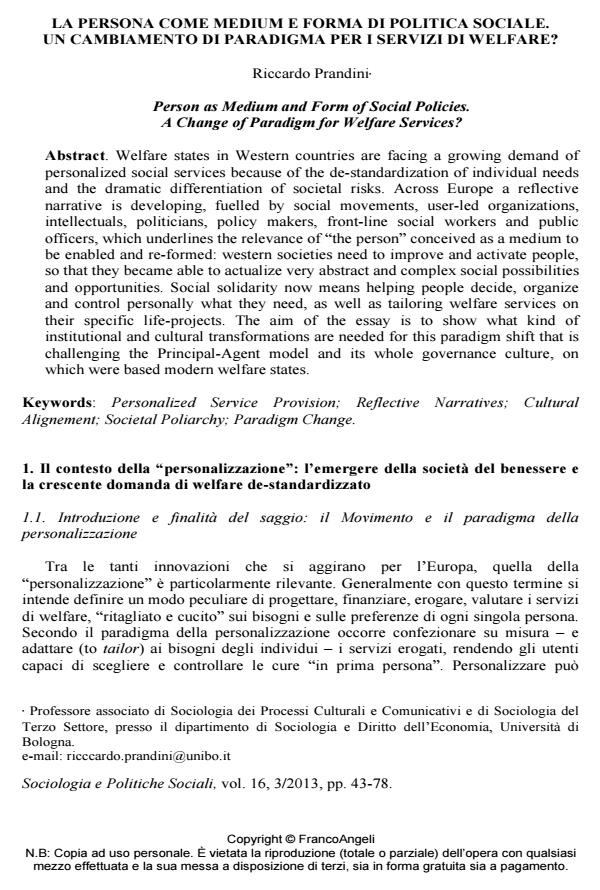Person as Medium and Form of Social Policies. A Change of Paradigm for Welfare Services?
Journal title SOCIOLOGIA E POLITICHE SOCIALI
Author/s Riccardo Prandini
Publishing Year 2014 Issue 2013/3
Language Italian Pages 36 P. 43-78 File size 901 KB
DOI 10.3280/SP2013-003003
DOI is like a bar code for intellectual property: to have more infomation
click here
Below, you can see the article first page
If you want to buy this article in PDF format, you can do it, following the instructions to buy download credits

FrancoAngeli is member of Publishers International Linking Association, Inc (PILA), a not-for-profit association which run the CrossRef service enabling links to and from online scholarly content.
Welfare states in Western countries are facing a growing demand of personalized social services because of the de-standardization of individual needs and the dramatic differentiation of societal risks. Across Europe a reflective narrative is developing, fuelled by social movements, user-led organizations, intellectuals, politicians, policy makers, front-line social workers and public officers, which underlines the relevance of “the person” conceived as a medium to be enabled and re-formed: western societies need to improve and activate people, so that they became able to actualize very abstract and complex social possibilities and opportunities. Social solidarity now means helping people decide, organize and control personally what they need, as well as tailoring welfare services on their specific life-projects. The aim of the essay is to show what kind of institutional and cultural transformations are needed for this paradigm shift that is challenging the Principal-Agent model and its whole governance culture, on which were based modern welfare states.
Keywords: Personalized Service Provision; Reflective Narratives; Cultural Alignement; Societal Poliarchy; Paradigm Change.
- Verso la misura della qualità familiare degli interventi: un percorso entro la sociologia relazionale Elisabetta Carrà, Donatella Bramanti, in SOCIOLOGIA E POLITICHE SOCIALI 1/2017 pp.61
DOI: 10.3280/SP2017-001004 - I distretti per la famiglia della provincia autonoma di trento: culture e strutture reticolari di una governance territoriale Riccardo Prandini, Luigi Tronca, in SOCIOLOGIA E POLITICHE SOCIALI 1/2019 pp.35
DOI: 10.3280/SP2019-001003
Riccardo Prandini, La persona come medium e forma di politica sociale. Un cambiamento di paradigma per i servizi di welfare? in "SOCIOLOGIA E POLITICHE SOCIALI" 3/2013, pp 43-78, DOI: 10.3280/SP2013-003003